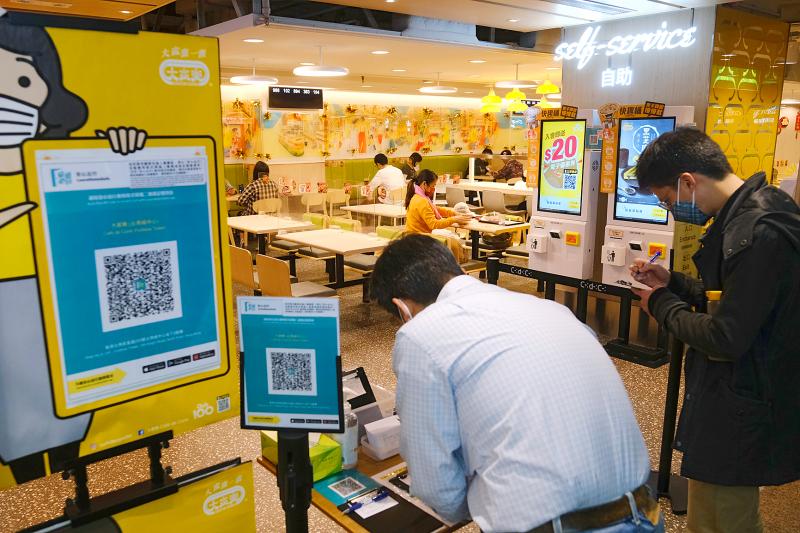Electronics shops in Hong Kong have seen a sharp increase in demand for cheap burner phones as the territory’s government eases restrictions amid the COVID-19 pandemic, but pushes the use of a contact-tracing app that has raised privacy concerns.
Pro-democracy protests erupted in Hong Kong in 2019 and a sweeping National Security Law was imposed last year by Beijing in response, along with the arrest of most of its prominent pro-democracy advocates.
The swift authoritarian turn taken by the government, which denies curbing the rights and freedoms of the territory’s 7.5 million residents, has resulted in deep-seated mistrust of public policies, including of measures to curb the pandemic.

Photo: Bloomberg
Hong Kong Secretary for Food and Health Sophia Chan (陳肇始) said that the app poses no privacy risks, as it only stores data on users’ phones and no third party collects them.
The app notifies users if they had been in the same place with a person confirmed with COVID-19.
“I’m buying a burner phone, because the government clearly doesn’t trust Hong Kong people, so why would I trust them?” said Vincent, 28, an accountant who gave only his first name because of the sensitivity of the issue.
In Sham Shui Po, more than a dozen vendors said that they have seen a spike in demand for old smartphones since last week, when the government announced plans to ease restrictions.
“People are just looking for a cheap smartphone that can run the LeaveHomeSafe app,” said Wong, a vendor at Phone House, who said she sold 50 phones in the past week, compared with the usual 10 or so per week previously.
Other vendors reported a three or four-fold increase in sales of cheap phones.
“I have seen a lot more people asking about and buying older phones over Chinese New Year,” said Andy Kwok of Ah Ling Telecommunications. “I have had to tell them the phone needs to be at least on Android 8 [for the app] to run.”
The most popular phone was the Samsung Galaxy J5, released in 2015, now selling for as little as HK$300 (US$38.70).
Meanwhile, newspaper publisher Jimmy Lai (黎智英) was again denied bail ahead of his April trial on charges of colluding with foreign forces.
Additional reporting by AP

A Chinese aircraft carrier group entered Japan’s economic waters over the weekend, before exiting to conduct drills involving fighter jets, the Japanese Ministry of Defense said yesterday. The Liaoning aircraft carrier, two missile destroyers and one fast combat supply ship sailed about 300km southwest of Japan’s easternmost island of Minamitori on Saturday, a ministry statement said. It was the first time a Chinese aircraft carrier had entered that part of Japan’s exclusive economic zone (EEZ), a ministry spokesman said. “We think the Chinese military is trying to improve its operational capability and ability to conduct operations in distant areas,” the spokesman said. China’s growing

Nine retired generals from Taiwan, Japan and the US have been invited to participate in a tabletop exercise hosted by the Taipei School of Economics and Political Science Foundation tomorrow and Wednesday that simulates a potential Chinese invasion of Taiwan in 2030, the foundation said yesterday. The five retired Taiwanese generals would include retired admiral Lee Hsi-min (李喜明), joined by retired US Navy admiral Michael Mullen and former chief of staff of the Japan Self-Defense Forces general Shigeru Iwasaki, it said. The simulation aims to offer strategic insights into regional security and peace in the Taiwan Strait, it added. Foundation chair Huang Huang-hsiung

PUBLIC WARNING: The two students had been tricked into going to Hong Kong for a ‘high-paying’ job, which sent them to a scam center in Cambodia Police warned the public not to trust job advertisements touting high pay abroad following the return of two college students over the weekend who had been trafficked and forced to work at a cyberscam center in Cambodia. The two victims, surnamed Lee (李), 18, and Lin (林), 19, were interviewed by police after landing in Taiwan on Saturday. Taichung’s Chingshui Police Precinct said in a statement yesterday that the two students are good friends, and Lin had suspended her studies after seeing the ad promising good pay to work in Hong Kong. Lee’s grandfather on Thursday reported to police that Lee had sent

A Chinese ship ran aground in stormy weather in shallow waters off a Philippines-controlled island in the disputed South China Sea, prompting Filipino forces to go on alert, Philippine military officials said yesterday. When Philippine forces assessed that the Chinese fishing vessel appeared to have run aground in the shallows east of Thitu Island (Jhongye Island, 中業島) on Saturday due to bad weather, Philippine military and coast guard personnel deployed to provide help, but later saw that the ship had been extricated, Philippine navy regional spokesperson Ellaine Rose Collado said. No other details were immediately available, including if there were injuries among